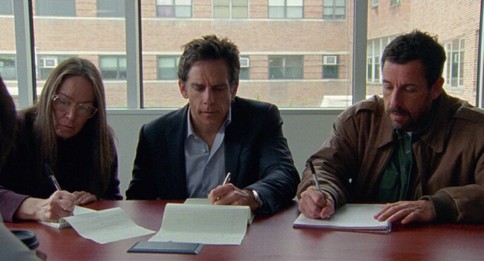B- | A dysfunctional family reunites around their father's pending retirement. Directed by Noah Baumbach Starring Ben Stiller, Adam Sandler, and Dustin Hoffman Initial Review by Jon Kissel |

A late line from Danny finds himself wishing that Harold had been a monster and done one unforgivable sin, instead of subjecting his children to death by a thousand cuts. The absence of one big thing keeps Danny from walking away entirely. It’s to Baumbach’s credit that he’s able to show Harold being both intolerable and tolerable. When Harold’s sloshed wife Maureen (Emma Thompson) is briefly out of town, Danny and Harold have a great time together, however short-lived their revelry might be. The good times seem to never be far away from Harold collapsing into a pit of self-pity and acting out in infuriating ways. His complete inability to dedicate more than a few sentences towards interest in someone else is omnipresent, as well as being the strongest trait that he’s passed on to his sons. As stressful as it clearly is to be around him, both the rapport that his sons have with him and the way things sometimes go well are enough to keep both Danny loyal.
Compared to Matthew, Danny has less of everything, so it’s harder for him to let anything, including perceived slights, go. If Danny had gone after a rude Frenchman who may or may not have grabbed Harold’s coat, Danny would have got in a fight on a street and lost. Matthew’s able to replace the lack of an extended family with work or his own West Coast family, at least for the time being. It’s no accident that he’s pulled back to New York just as his own marriage is failing and he’s having a hard time connecting with his young son who just wants to talk about ninjas. His family might not respect his work, but they are something to potentially replace relationships on the downswing with. Danny does the same kind of swap, trading an okay if dependent relationship with his dad for a renewed one with Matthew and a potential one with Mrs. Daniel Day-Lewis, Rebecca Miller. I appreciate that the film never forces sympathy onto Harold beyond the facts of his condition. Sure, he’s a sick old man, but he’s also a jerk who wonders why people don’t want to be around him. He’s the Raylan Givens asshole, in which he meets assholes all day without realizing that it’s him that’s provoking all this shitty behavior. It’s totally fine to cut someone like that out of your life, or at least minimize time with them, whispered ‘I forgive you’s’ or not.
The women of the film have the good sense to not get caught up in feeling sorry for themselves or wondering where it all went wrong. Thompson’s Maureen is another mess of a human being, but Thompson gives her a delightful air of not caring what people think, something her husband and stepsons could learn more of. Grace van Patten, playing Danny’s daughter Eliza is a weak link for me, as I never buy her relationship with Sandler and abhor her character’s unearned confidence, but she is the one who escaped all this dysfunction. Her films, unwatchable and pointlessly transgressive, are not the kind of thing someone who ever had a second thought about her abilities could make, a trait in sharp opposition to her father and one that gives her the ability to at least put herself out there and create something, terrible though it may be. Marvel’s Jean makes the film for me. She’s a character who lived through more or less what Danny lived through, but came out of it with a clearer knowledge of how she’s damaged and therefore less of a penchant to externalize her problems. She’s got none of Danny’s anger, because she knows how useless it is. Baumbach tips his hand towards his appreciation of Jean by giving her the film’s best lines, and Marvel knows what to do with them.
When Matthew and Danny finally have it out in the grass, the film clicked for me. Matthew didn’t understand why everyone doesn’t just walk away from the negative person that is Harold, while Danny wonders how he could even do such a thing. Both are half right and half wrong, but they are fundamentally incapable of understanding each other. The films ends with the brothers swapping perspectives, as Matthew realizes that it’s his turn to take care of their father for a little bit and Danny realizing that it’s okay for him to leave. As previously stated, the far superior Squid and the Whale came to a similar conclusion about bad parents and what they’re owed, which is clarity. Danny saw his dad as better than he was, Matthew saw him as worse, and their perceptions meet in the middle by the end.
I liked big stretches of Meyerowitz Stories even as I grow tired of Baumbach’s increasingly repetitive depiction of arty New Yorkers and their petty insecurities. He always writes witty dialogue, making it easy for actors to at least sound good. His cast fills in that repartee with earnestness, and except for Van Patten, I think everyone’s good to great, including Sandler, my nemesis. Well-off adults that don’t have their emotional shit together or lack all self-awareness is not my favorite plot, but there are far worse indie writers and directors than Baumbach. The Meyerowitz Stories is easy to admire, and with a greater focus on its female characters, would have been easy to love. B-
 RSS Feed
RSS Feed